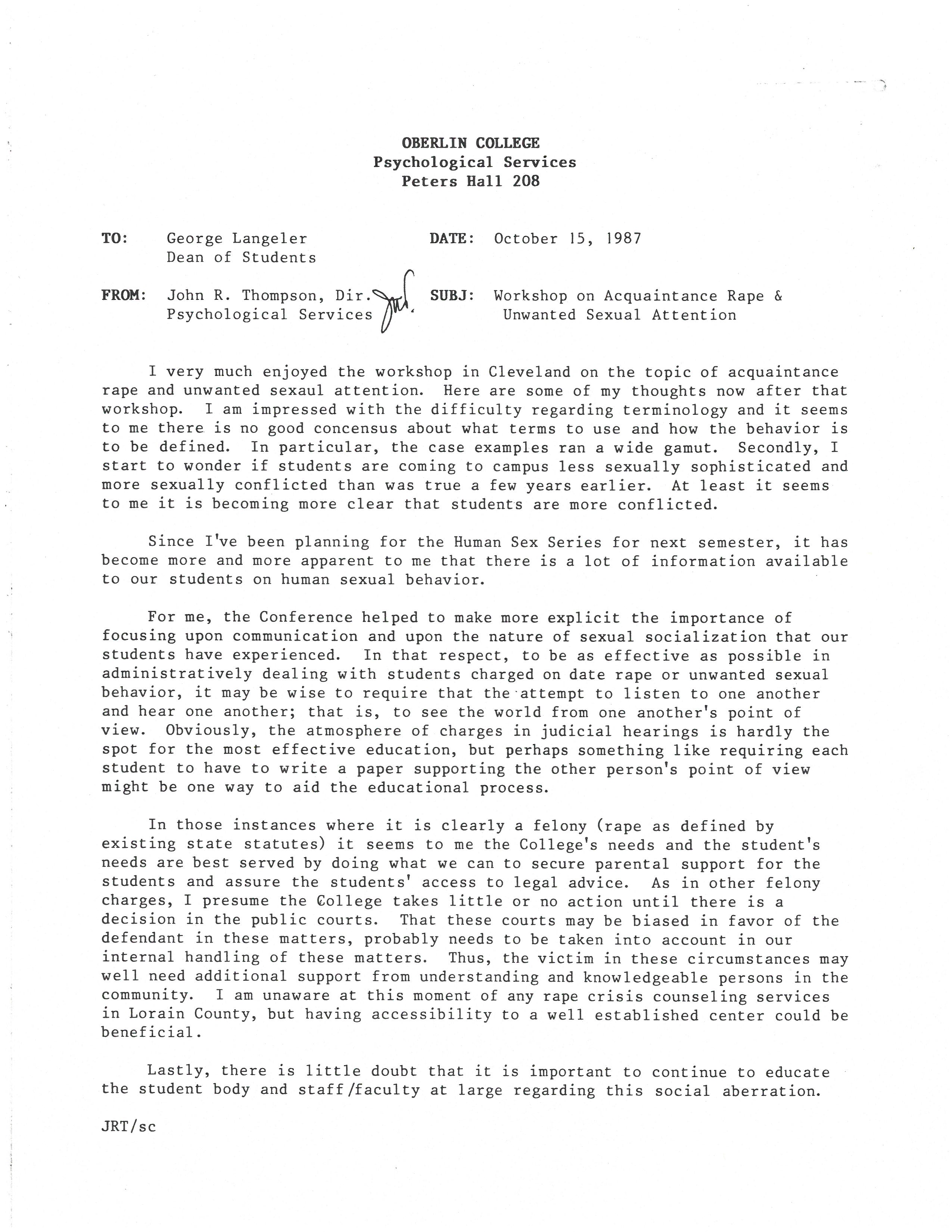|
|
Transcription:
OBERLIN COLLEGE Psychological Services Peters Hall 208
TO: George Langeler DATE: October 15, 1987 Dean of Students
FROM: John R. Thompson,[3] Dir. SUBJ: Workshop on Acquaintance Rape & Psychological Services[4] Unwanted Sexual Attention
I very much enjoyed the workshop in Cleveland on the topic of acquaintance rape and unwanted sexaul [sic] attention. Here are some of my thoughts now after that workshop. I am impressed with the difficulty regarding terminology and it seems to me there is no good concensus [sic] about what terms to use and how the behavior is to be defined. In particular, the case examples ran a wide gamut. Secondly, I start to wonder if students are coming to campus less sexually sophisticated and more sexually conflicted than was true a few years earlier. At least it seems to me it is becoming more clear that students are more conflicted.
Since I’ve been planning for the Human Sex Series for next semester, it has become more and more apparent to me that there is a lot of information available to our students on human sexual behavior.
For me, the Conference helped to make more explicit the importance of focusing upon communication and upon the nature of sexual socialization that our students have experienced. In that respect, to be as effective as possible in administratively dealing with students charged on date rape or unwanted sexual behavior, it may be wise to require that the attempt to listen to one another and hear one another; that is, to see the world from one another’s point of view.[5] Obviously, the atmosphere of charges in judicial hearings is hardly the spot for the most effective education, but perhaps something like requiring each student to have to write a paper supporting the other person’s point of view might be one way to aid the educational process.
In those instances where it is clearly a felony (rape as defined by existing state statutes) it seems to me the College’s needs and the student’s needs are best served by doing what we can to secure parental support for the students and assure the students’ access to legal advice. As in other felony charges, I presume the College takes little or no action until there is a decision in the public courts.[6] That these courts may be biased in favor of the defendant in these matters, probably needs to be taken into account in our internal handling of these matters. Thus, the victim in these circumstances may well need additional support from understanding and knowledgeable persons in the community. I am unaware at this moment of any rape crisis counseling services in Lorain County,[7] but having accessibility to a well established center could be beneficial. Lastly, there is little doubt that it is important to continue to educate the student body and staff/faculty at large regarding this social aberration.
JRT/sc
[Transcribed by Tory Sparks] |
[1] See Document 5.
[2] See Appendix 2.
[3] John R. Thompson was a Professor of Psychology at Oberlin and the Director of Psychological Services, 1964-1984. Thompson was a proponent of civil rights and an early advocate for LGBTQ students. According to the Oberlin College LGBT Community History Project: “By all accounts, Thompson was a remarkable man. A young, liberal psychologist, he was the first director of Oberlin Psychological Services, which formed due to overwhelming student demand in 1964 … Thompson was well suited to the politicized student climate: during the mid-1960s he gave a campus talk titled ‘Revolution,’ and another on the history of ‘racist oppression.’ In the 1966 Oberlin Alumni Magazine, he extolled ‘Voltaire’s notion that good and bad are not absolutes,’ called ‘Marxist Communism…an excellent form of government for the peoples of the world,’ and celebrated the ‘heterogeneous population’ of the college, where ‘our freshman boy’ with ‘notions about virile, red-blooded, 100% American males… finds himself with a roommate who can cry, who admits to having affection and tender feelings, who enjoys reading poetry, listens to classical music, [and] says he’s not sure how he really feels about girls’” (“Faculty, Staff, and Trustees – Oberlin College – Acalog ACMS,” Accessed 15 July 2016. Source; “Roger Goodman and John Thompson: A Therapeutic Relationship and a Senior Perspective (1964-1968) | Oberlin College LGBT Community History Project,” 15 Accessed July 2016. Source).
[4] Initialed in pen here, J– (illegible, but seems to be John R. Thompson’s initials)
[5] This suggestion would basically force a victim of sexual assault or rape to educate their attackers. While Thompson was far from alone in this sort of thinking, his insistence on the need for communication between the accuser and the accused in cases of date rape and unwanted sexual behavior reveals a lack of understanding that these are both crimes with the potential to truly devastate victims. In viewing date and acquaintance rape less seriously than it appears he would a case of stranger-rape, Thompson shows that despite all this consciousness raising, his thoughts on the subject are still deeply informed by a pervasive rape culture.
[6] In this file, there is a document on the Residential Life letterhead that gives the State of Ohio Criminal Justice Code Summary of Sex Offenses, which implies that the college did in fact defer to state law in felony cases. (State of Ohio Criminal Justice Code Summary of Sex Offenses Residential Life Memo, 16 September 1987, Administrative Records, Dean of Students, Box 7, O.C.A.)
[7] The Nord Center’s Rape Crisis Services began in 1989 (“The Nord Center Timeline,” The Nord Center, Accessed 15 July 2016. Source).
